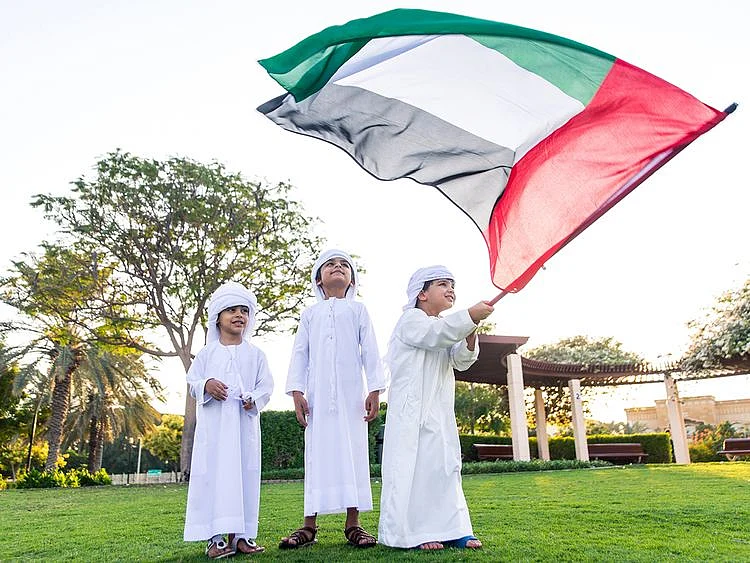Empowering children through cultural identity: A path to self-esteem and inclusivity
A strong sense of cultural identity promotes social cohesion and reduces prejudice

Culture and identity are often taken for granted. We assume our children will pick up our habits and customs organically, and many may overlook the importance of actively instilling these values in children from an early age. A clear sense of cultural identity shapes children into confident and open-minded adults, as these values impact society. In Abu Dhabi, for example, culture and identity influence children’s values, worldviews, and sense of belonging. As a rapidly modernising Emirate, Abu Dhabi balances traditional Emirati customs with the global influences brought by its diverse population.
We recently concluded the World Early Childhood Development (WED) Forum, part of the Abu Dhabi Early Childhood Week. The forum delved deeply into the role of culture and identity in supporting children’s development. Various global and local experts shared their valuable insights and unanimously spoke of the importance of celebrating our unique cultural heritage.
For children growing up in this unique environment, the blend of local heritage, Islamic traditions, and multicultural exposure contributes to a rich, multifaceted identity. Cultural practices, language, and family structures help anchor Emirati children to their roots, while the city’s international atmosphere encourages adaptability and open-mindedness. Understanding the impact of these cultural dynamics is critical to supporting children's social and emotional development and fostering a strong connection to their heritage.
The positive social change resulting from clear identity-building practices in children helps shape confident, empathetic, and open-minded individuals capable of fostering inclusivity and mutual respect in diverse societies. When children have a strong sense of cultural identity, they are more likely to appreciate and respect the traditions of others, promoting social cohesion and reducing prejudice. Exposure to different cultures, alongside pride in their heritage, encourages them to be more adaptable and creative in solving social challenges. Moreover, understanding their identity helps children develop emotional resilience and a sense of belonging, equipping them to engage meaningfully in their communities and advocate for equality, sustainability, and justice.
As they grow, these qualities become the foundation for leadership and collaborative efforts that drive positive social transformation. The development of culture and identity in children brings numerous benefits, significantly influencing their emotional, social, and cognitive growth, such as:
• Raising self-esteem: A strong cultural identity helps children feel confident and valued. They develop a positive sense of self when they understand and take pride in their heritage, traditions, and language. This self-awareness and cultural pride contribute to higher self-esteem, as children feel grounded in their uniqueness and more capable of confidently navigating the world.
• Promoting equality: Teaching children about their culture and exposing them to the diversity of others fosters an appreciation for different backgrounds and experiences. This nurtures empathy, reduces stereotypes and encourages fairness, which helps children grow up with a mindset that values equality and inclusiveness. Understanding cultural diversity from a young age enables them to challenge prejudice and advocate for social justice.
• Cognitive development: Cultural learning stimulates cognitive development by exposing them to different perspectives, languages and problem-solving strategies. Multicultural experiences and bilingualism enhance cognitive flexibility, critical thinking and creativity. Learning about customs, arts and histories enriches their knowledge base and helps them become more adaptable and innovative thinkers.
• Sense of belonging: A strong connection to culture and identity gives children a sense of belonging within their families and the larger community. Connecting to their heritage provides emotional security and strengthens social bonds, enabling children to build meaningful relationships. This sense of belonging is crucial for mental well-being, as it helps them feel rooted, supported and part of something larger than themselves.
Together, these benefits contribute to well-rounded, socially responsible individuals who confidently navigate diverse environments while promoting respect, inclusion and community cohesion.
In today's rapidly evolving world, we must acknowledge the dual role of technology in shaping our lives. Digital platforms increasingly shape our interactions and cultural expressions, and we’re shifting toward a globalised, often homogenised monoculture. This makes preserving the unique values, identities, and cultural roots that define our societies more crucial than ever.
Technology, when used thoughtfully, can play a transformative role in supporting this effort - especially in the context of early childhood development. By creating accessible, engaging resources that celebrate heritage and cultural identity, we can empower parents, educators, and children to maintain a strong sense of cultural belonging. Technology provides parents and educators with accessible tools and platforms that promote cultural awareness. Digital resources, including educational apps, e-books and interactive websites, such as the UAE Heritage App, Twikl and others, offer rich content about Emirati heritage, language and Islamic traditions, helping children connect with their cultural roots. Furthermore, virtual reality (VR) and augmented reality (AR) technologies create immersive experiences, such as virtual tours of historical sites and cultural festivals, allowing children to engage dynamically with their heritage.
For educators, technology facilitates the development of culturally relevant curricula by offering diverse materials that blend local traditions with global perspectives. Language-learning apps play a crucial role in reinforcing the Arabic language, ensuring that children maintain their linguistic and cultural heritage in an increasingly multilingual environment.
Ultimately, technology can bridge the gap between tradition and modernity, providing innovative ways to preserve and promote cultural identity. This is vital as we navigate a digital landscape that risks homogenizing our diverse cultures, ensuring that children in Abu Dhabi grow up with a strong sense of belonging and an appreciation for cultural diversity.
- Saleha Al Azri is the Director for Data, Research, and Innovation at the Abu Dhabi Early Childhood Authority (ECA), a government entity based in Abu Dhabi, overseeing the early childhood development sector in the region.
Sign up for the Daily Briefing
Get the latest news and updates straight to your inbox
Network Links
GN StoreDownload our app
© Al Nisr Publishing LLC 2026. All rights reserved.